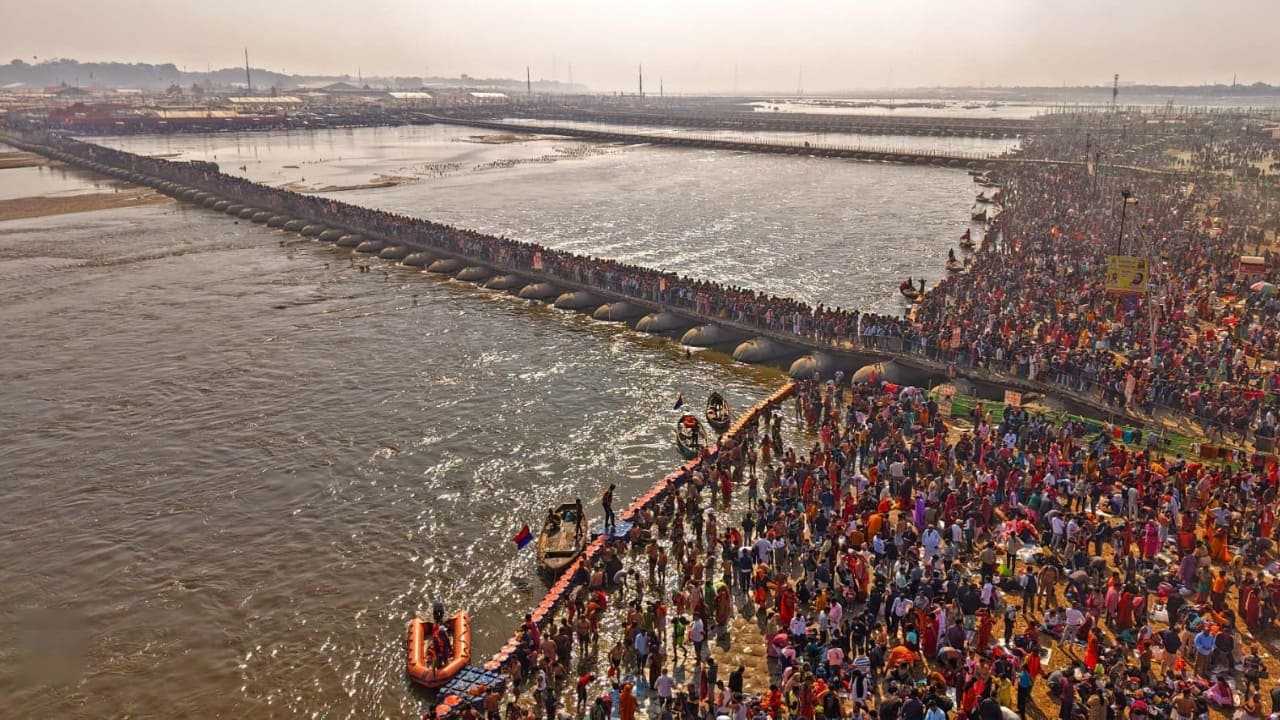The city of Prayagraj (formerly Allahabad) in Uttar Pradesh is home to one of the most sacred sites in Hinduism—Triveni Sangam, the confluence of the Ganga, Yamuna, and the invisible Saraswati River. Revered by saints, sages, and scriptures alike, this divine junction is not just a geographical marvel but a spiritual powerhouse where heaven seems to touch earth.
Every drop of water here is believed to be infused with divine energy, and a dip at the Sangam is said to wash away lifetimes of sins. Let us take you on a journey to understand the spiritual, historical, and cultural significance of this holy confluence and why it continues to draw millions of pilgrims every year.

What Is Triveni Sangam?
Triveni Sangam literally means “confluence of three rivers.” Here, the sacred Ganga, which is revered as the purifier of sins, meets the mystical Yamuna, known for its depth and dark blue waters. The third river, Saraswati, is said to flow underground and invisibly, believed to be the source of divine knowledge and speech.
This confluence is a Tirtha Raj, or “King of Pilgrimage Sites,” according to Hindu tradition.
Spiritual Significance of Triveni Sangam
A dip in the Sangam is not an ordinary bath—it is a sacred ritual of purification and rebirth. The Skanda Purana and other ancient scriptures affirm the spiritual potency of this confluence.
- Karma Cleansing: Bathing at Triveni Sangam during special occasions like Kumbh Mela, Magh Mela, or Amavasya is said to absolve even the worst karmic debts.
- Gateway to Moksha: Many Hindus perform the Pind Daan ritual here to ensure peace for the souls of ancestors.
- Spiritual Recharge: Yogis and saints often meditate on its banks, harnessing the cosmic energy where the rivers meet.
The Kumbh Mela: World’s Largest Spiritual Gathering
Every 12 years, Triveni Sangam becomes the center stage for the Kumbh Mela, attracting tens of millions of devotees from all over the world. This event is one of the largest congregations of humanity ever assembled for a spiritual cause.
- Ritual Baths: Holy dips during Shahi Snan dates are considered the most auspicious.
- Sadhus & Akharas: Rare sightings of Naga Sadhus, spiritual discourses, and religious processions make it a once-in-a-lifetime experience.
- UNESCO Heritage: The Kumbh Mela has been recognized as an Intangible Cultural Heritage of Humanity by UNESCO.
Mythological Legends of the Sangam
Triveni Sangam has deep roots in Hindu mythology:
- Lord Brahma’s Yajna: It is believed that Brahma performed the first yagna (sacrificial fire ritual) here after creating the universe.
- Saraswati’s Hidden Flow: According to the Rig Veda, Saraswati vanished underground due to ecological changes, and her presence is now felt spiritually.
- Ramayana Connection: Lord Rama is said to have visited Prayagraj during his exile and met Sage Bharadwaj near the Sangam.
Where to Bathe and Worship
Sangam Nose (Exact Confluence Point)
You must hire a wooden boat from the ghats to reach the exact point of confluence. Here, you can perform:
- Snan (Holy Bath)
- Puja & Tarpan (Ancestor Rituals)
- Ganga Aarti on the Boat
Nearby Temples to Visit
- Bade Hanuman Temple (reclining Hanuman idol)
- Alopi Devi Temple
- Akshayavat Tree inside Allahabad Fort
- Shivkoti Mahadev Temple
Best Time to Visit Triveni Sangam
| Season | Highlights | Weather |
|---|---|---|
| October–March | Ideal for bathing & sightseeing | Pleasant, 10°C–25°C |
| January–February | Magh Mela (Annual Spiritual Fair) | Chilly but festive |
| Kumbh Mela Year | Occurs every 12 years | Massive gatherings |
Cultural & Religious Activities at the Sangam
Ganga Aarti at Saraswati Ghat
Every evening, priests perform the Ganga Aarti with lamps, chants, and conch shells, offering gratitude to the river goddesses.
Bhajan-Kirtans
During the mela and festivals, devotional singing fills the air, creating a divine atmosphere.
Spiritual Walks
You can also walk through Ram Ghat, Dashashwamedh Ghat, and other banks where sages meditated and performed rituals.
Tips for First-Time Visitors
- Hire boats from authorized boatmen to ensure safety and fair prices.
- Photography is allowed, but always ask locals before capturing rituals.
- Carry drinking water, sunscreen, and slippers, especially during hot weather.
- Respect local customs and traditions when attending pujas or bathing ceremonies.
- Donations are welcome, but avoid giving money to unauthorized beggars or agents.
How to Reach Triveni Sangam
- By Air: Nearest airport is Prayagraj Airport (Bamrauli) – 12 km away.
- By Train: Well connected via Prayagraj Junction and Prayagraj Sangam Station.
- By Road: Accessible by NH-2 from Varanasi, Lucknow, and Kanpur.
- Local Transport: E-rickshaws, autos, and private cabs available easily.
Places to Explore Around Triveni Sangam
| Place | Distance | Highlights |
|---|---|---|
| Allahabad Fort | 1 km | Akbar’s historical marvel |
| Khusro Bagh | 5 km | Mughal tombs and Persian gardens |
| Bharadwaj Ashram | 3 km | Mythological site from Ramayana |
| Anand Bhavan | 6 km | Home of the Nehru family |
Conclusion
Triveni Sangam is not just a destination—it is a revelation. It is where rivers meet, where history breathes, and where the soul is stirred awake by divine resonance. Whether you come here for a holy dip, a family ritual, or sheer spiritual curiosity, the energy of the Sangam will stay with you long after you’ve left its shores.
It is the spiritual heart of India—timeless, eternal, and ever-flowing, just like the holy rivers it unites.
Would you like a printable version of this guide or to include it in your Prayagraj tour package with TripCosmos.co?





